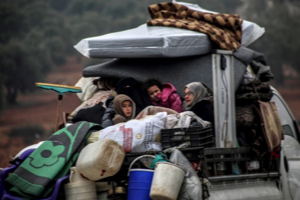
The Day After Association held last February 2 dialogue seminars, in cooperation with Syrian journalist Ahmed Mazhar Saado and former judge Hussam al-Shihna, attended by a group of victims of forced displacement in Syria.
First Seminar
The first seminar focused on the concept of Syrian patriotism and its direct link with civil peace, to educate IDPs on the importance of societal peace and the relevance of national identity in its establishment.
According to the symposium’s lecturer, journalist Ahmed Mazhar Saado, “Syrian patriotism must be established on the basis of civil peace, and must benefit and protect it and vice versa, especially after everything that happened in Syria during the past ten years,” stressing that this matter is “linked directly and closely with the identity of the person responsible for protecting the Syrian cause. “
Saado put forth many questions about “the ability to discuss Syrian patriotism at present, in the absence of all forms of protection, and with the violations and mistakes committed even by the opposition during the years of the revolution,” stressing that “the true protector must be of the street, there must not be a repeated scenario of the Syrian opposition in its current form, which was unable to produce anything, “as he put it.
The Syrian journalist said that “working to pair Syrian patriotism and civil peace must also be linked to the changing Syrian reality, both at home and abroad, focusing on an inclusive national contract,” because, according to Saado, “Syrians urgently need an inclusive national contract which does not exclude anyone and which is based on several things, most notably:
- Separation of powers
- Cohesion and harmony among all Syrians
- Relying on the entire local civil society, so it can play a real role in the re-formation of the Syrian homeland and a future unified nation-state, one which security and intelligence services or any kind of faction can one day infringe upon”.
The symposium answered several questions, most significantly about the importance of forming Syrian patriotism in order to accomplish an inclusive national contract, an important national necessity, now more than ever.
It also touched on the national and ethnic pairing, as Saado believes “it is not possible today to talk about any ethnic dimension in Syria without beginning at the one Syrian national melting pot, understanding its variables and the essence of a common Syrian national identity,” considering that “we cannot move to the ethnic dimension and tendency without first going through the national”.
He concluded: “There is nothing to agitate the overlap of national and ethnic, except for national chauvinists who have not yet comprehend the nature of the relationship between the national and the ethnic,” stressing that “a unifying Syrian patriotism with no sectarian detachments is what raises civil peace and builds Syrian society”, and that “civil peace is a necessary condition for building nations.”
Second Seminar
The second seminar, in cooperation with former judge Hussam Al-Shihna, attended by victims of forced displacement in Syria, focused on land, housing and property rights for the forcibly displaced and sent important messages and recommendations in this regard.
During the seminar, Al-Shihna explained types of land and property, types of rights and ownership, how to establish these rights, dispute resolution mechanism, and the most important obstacles that prevent the forcibly displaced from accessing their property and housing rights.
The seminar touched on the multiple obstacles that Syrian women face concerning all of the aforementioned, and also talked about the importance of organizing power of attorney to follow up on legal procedures regarding real estate and property,and ways of organizing this, as it is one of the most important procedures to preserve and protect property.
Al-Shihna concluded the seminar by stressing the following recommendations:
First, raising awareness of the issue of ownership, because it is a “national issue,” according to his description, and “preserving property is a form of resistance.”
Second, understanding housing, land and property rights, and knowing the laws that govern them, relevant documents, their founding framework, courts specializing in their cases, and methods of dealing with all related matters.
Third, establishing a means of communication among residents of all regions that have witnessed waves of forced displacement, or have received victims of forced displacement, in order to share experiences and exchange knowledge and information about housing and property rights.
Fourth, focusing on properties that have been registered in marginalized and vulnerable areas, such as irregular settlements.
Fifth, reviewing real estate laws by displaced persons themselves, and following up on their homes and properties.
Sixth, issuing personal and real estate documents, and organizing power of attorney for a lawyer or relative.
